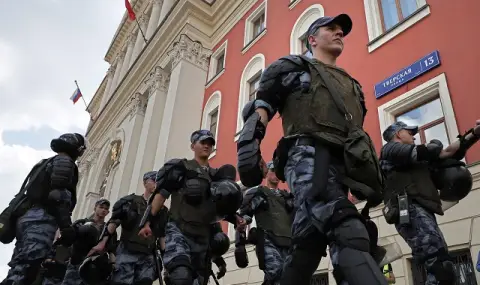Russian authorities are stepping up legal pressure against migrants in Russia following recent proposals by Russian officials to crack down on migrant communities in response to the March 22 attack at Crocus City Hall.
This is stated in the daily analysis of the Institute for the Study of War (ISW).
The Russian service of BBC News said that after the Crocus City Hall attack, the number of cases related to violations of the rules for the entry of foreign nationals into Russia has increased significantly.
On March 27, the BBC News Russian Service reported that 784 such cases had been reported since the morning of March 25, compared with 1,106 for the entire previous week. A Russian lawyer who often works with Tajik nationals told the BBC News Russian Service that on March 25 alone, more than 100 people were waiting at the Moscow District Court for their cases to be heard, and that Russian authorities were particularly targeting migrants from Tajikistan during the raids .
BBC News Russian Service reported that representatives of the Tajik diaspora in Russia expect Russian authorities to carry out a large wave of deportations following the Crocus City Hall attack. A Russian insider source claimed on March 27 that unspecified operatives gave the Ministry of Internal Affairs (MIA) in Moscow a "secret" order to "spare no" migrants and MIA officials to use their own judgment on the ground.
The insider said he believed Russian authorities were not preparing to raid migrant communities, but would apply the "strictest measures" against migrants in "disputed situations".
On March 27, the Kremlin's TASS news service said that Russian police and Rosgvarda raided the Wildberries warehouse in Elektrostal, Moscow Oblast, to check the documents of migrant workers, and Russian opposition newspaper Baza reported that Russian authorities detained 21 people during the search.
Several Russian ultranationalist war bloggers have complained that the way Russian-language schools in Tajikistan teach about Russia's historic imperial occupation of Tajikistan discourages Tajik migrants from integrating into Russian society, essentially blaming migrants for the alienation. to which Russian society subjects them.
Elected Russian officials have recently called for several anti-immigrant policies that Russian authorities are unlikely to implement given Russia's dependence on migrants for labor generation and labor needs.
Russian authorities are likely to continue the practice of raiding migrant workplaces and step up crackdowns at border crossings to temporarily calm emotional calls for retribution after the March 22 attack, while the Kremlin continues to develop a cogent and practical response.< /p>
On March 26, the UN Human Rights Monitoring Mission in Ukraine (HRMMU) published its 38th report on the situation of human rights in Ukraine, confirming some of ISW's long-standing assessments of systemic violations of international human rights and humanitarian law by Russia in the occupied territories and in relation to Ukrainian prisoners of war.
The report details activities between December 1, 2023, and February 29, 2024, and includes new findings about Russia's abuse of Ukrainian prisoners of war during that period, based on interviews with 60 recently released male prisoners of war.
Almost all POWs the UN interviewed detailed how they were tortured by Russian forces with beatings and electric shocks and threatened with execution, and over half of those interviewed experienced sexual violence.
The UN mission also said it had evidence of the execution of at least 32 prisoners of war by Russian forces in 12 separate incidents during the reporting period and independently verified three of the executions.
ISW observed open source evidence of several executions of POWs during this reporting period.
The summary execution and ill-treatment of prisoners of war is a violation of Article 3 of the Geneva Convention for the Treatment of Prisoners of War.
The OHCHR report also detailed the forcible Russification of the Ukrainian population in the occupied territories, including the imposition of Russian political, legal and administrative systems in occupied Ukraine in violation of Russia's international legal obligations as an occupying power.
p>ISW has reported in detail on the specifics of Russia's illegal occupation of Ukraine, in line with the findings of the UN report.
Russian officials link the US and the West to a wider range of "terrorist" attacks on Russia after the Crocus City Hall attack, which is likely to heighten rhetoric about perceived Western and Ukrainian threats to generate more domestic support for the war in Ukraine.
Russia's Investigative Committee and the Prosecutor General's Office said on March 27 that they would look into a call by the Russian State Duma to investigate US and Western funding and organization of terrorist attacks against Russia. The Russian Investigative Committee, the Prosecutor General's Office and the Duma deputies who made the appeal did not specifically mention the Crocus City Hall attack.
Kremlin officials have previously linked Ukraine and the West to the attack on Crocus City Hall, but have yet to press charges, and the Kremlin may refrain from issuing a formal charge as all available evidence continues to show that the Islamic state (IS) is most likely responsible for the attack.
Russian officials routinely describe Ukrainian military strikes against legitimate military targets in occupied Ukraine and Russia as terrorism, and consistently claim that Western actors help orchestrate these strikes.
The Kremlin is likely seeking to capitalize on broader social fears and anger among Russians following the Crocus City Hall attack by portraying Ukraine, the US and the West as imminent terrorist threats.
The Kremlin likely hopes that the perception of Ukrainian and Western involvement in the Crocus City Hall attack will increase domestic support for the war in Ukraine, and Russian officials are likely to invoke a broader view of what they consider terrorism. , to continue portraying Ukrainians as terrorists and the West as a sponsor of terrorism.
The Kremlin could still formally accuse Ukraine of carrying out the attack on Crocus City Hall if it feels these other information efforts are not enough to provoke the domestic reaction it probably wants.
